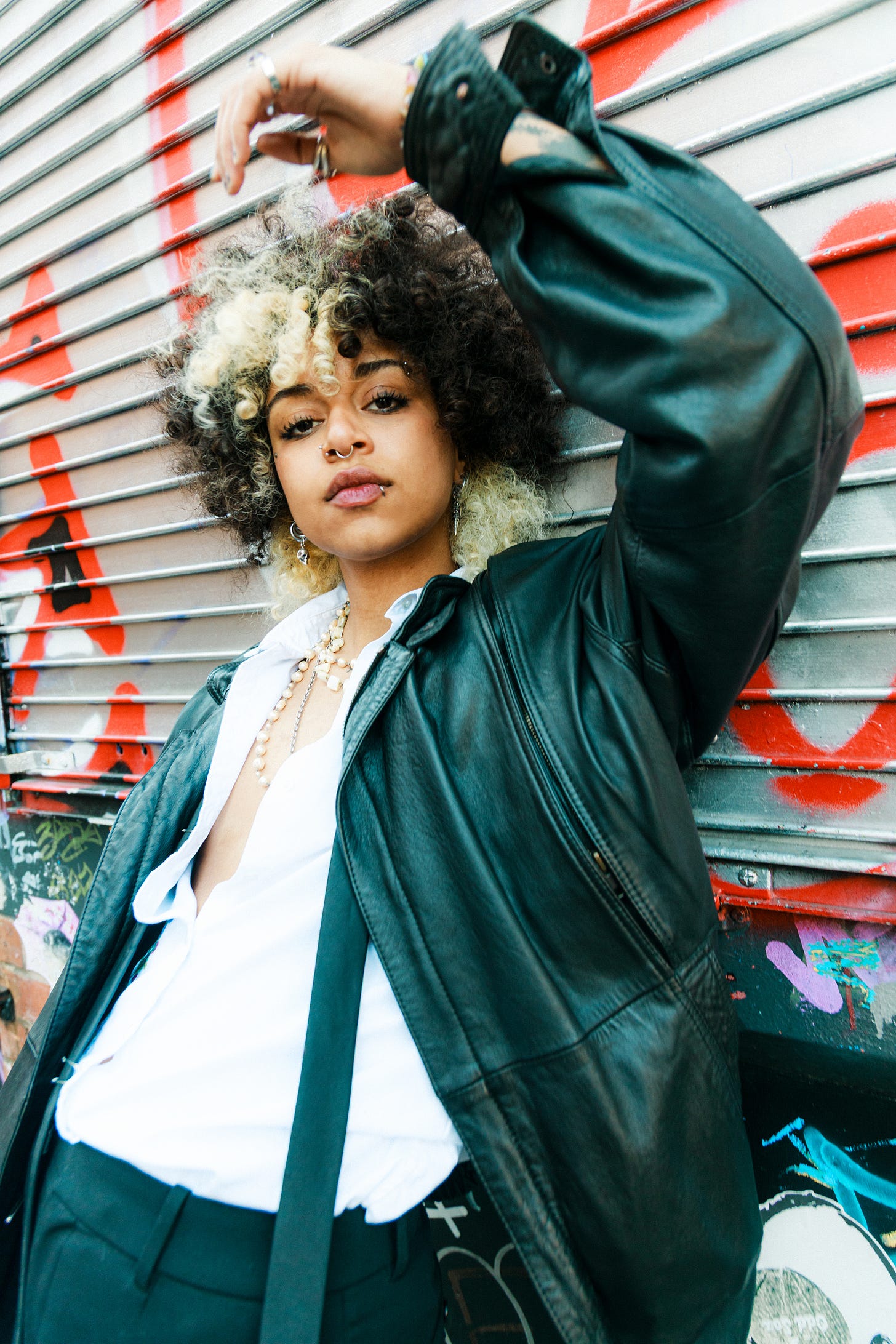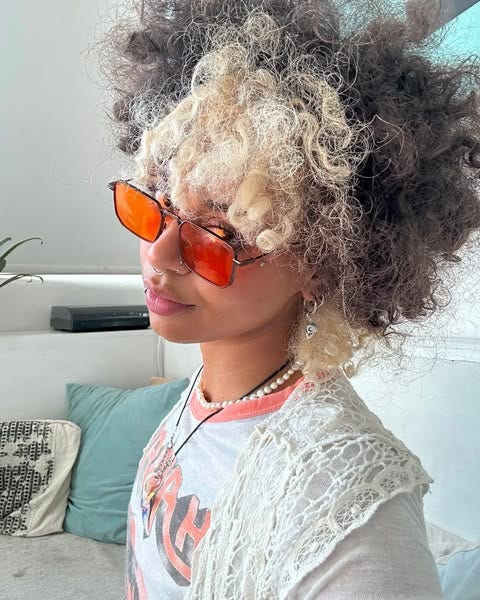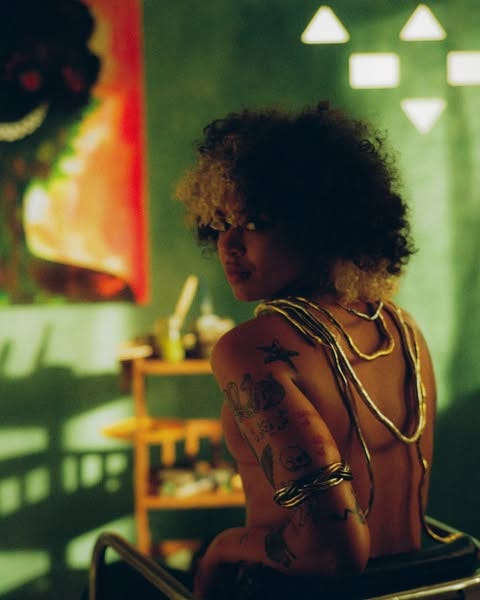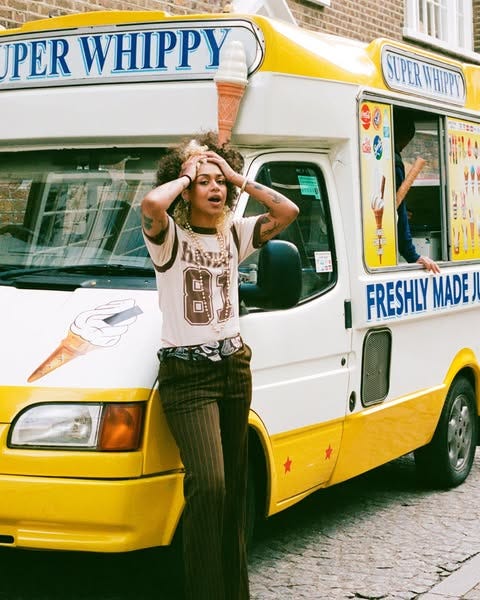Nxdia: “You can’t accept me into a society in which I already exist”
The musician on the history we wear on our faces, being grateful for feeling uncomfortable and meaningless discourse
Hi, welcome back to Mixed Messages! There’s just over a week to go until Mixed Messages Live! On Tuesday 1st July, we’ll be at Lush Beak Street with William Hunter, Deepa Paul and Megan Jayne Crabbe. Books will be on sale with Round Table Books and I’m working on an amazing goody bag for you. Last year was such a special evening, I can’t wait to see you IRL again soon!
This week’s guest is musician Nxdia, who is of mixed-Sudanese and Egyptian heritage. Their new mixtape, I Promise No One’s Watching, is out now and makes the perfect alt-pop-punk summer soundtrack – especially for not-so-former emos like Nxdia and I (it was never a phase.) Read their story below.
How do you describe your identity?
I say mixed-heritage. I’m from Sudan and Egypt, which are so close to each other. I grew up in Cairo, darker than the other kids. They definitely let me know that I was different.
I moved to the UK when I was eight. I always had that Sudanese side, but I don’t know the Sudanese dialect so I don’t feel as connected in that way. Still, the history is there and the history is on my face, whether I'm connected to it personally or not.
Do you feel comfortable describing yourself as both Egyptian and Black?
Black culture can sometimes be defined in a very specific way, where I’ve not felt connected to every single avenue. There’s so many ways of being of a certain race or background. Certain elements are highlighted and integral and others are varied, and that’s a beautiful thing.
I’ve had people tell me “you're not Black,” almost to say ‘don’t worry,’ and I’m like ‘no, bitch, actually I’m Black.’ My cousins are beautiful and super dark skinned, then my cousins on the other side are so pale. I happen to be in the middle, these are both sides of me and I'm not going to feel ashamed of either. At the end of the day, it’s me and I'm super proud of that. As if anyone would look at me and not think I was Black.
Your difference was pointed out to you in both Cairo and Manchester – did those experiences feel similar?
In different parts of the world, people are more direct with racism and colourism. Growing up, I’d be compared to a really dark skinned footballer. I didn't realise it was meant as an insult. I'm not even that dark skinned – if I'm receiving this, what is someone who is darker than me getting?
People think there’s not a racism problem in the UK, or that because it’s passive aggressive and not as direct that we don't understand the implications – as if we're not intelligent enough to understand when someone's trying to differentiate us from them.
In high school, it was so stark. I was bullied quite badly in Egypt for being darker. Then I came here, and in a way there was some kind of celebration. The whole light-skinned versus dark-skinned discussion that was happening growing up was just disgusting. Why are we fighting within our own community?
How did that make you feel, when as a teenager you just want to fit in?
I would sometimes tell people I was mixed white and Black so that it was easier. A proximity to whiteness felt like safety for me.
When I go to Cairo, they talk to me as if I'm a foreigner because I’m covered in tattoos and piercings, and I’m tall. Here, I just wanted to go under the radar. I wanted to not be so aware that I look different to other people. Now I'm so grateful that it doesn't even cross my mind. I'm not in that small microcosm anymore where everyone around me is homogeneous.
You’ve also had people saying you ‘don’t look Arabic’ – does that bother you?
Growing up, I’d speak Arabic on the phone to my mum so quietly. I didn't want people to know. It was just about trying to fit into something that felt quite rigid at the time. Now, it’s different. I feel really proud of my heritage.
I once heard people talk about me in Arabic, about how women dress so masculine these days, and it was a beautiful moment when I let them finish and then responded in Arabic. Some people see it, some people don't.
What was your cultural upbringing like?
I grew up in a house covered in different influences. We had beautiful carpets, ate Egyptian food all the time like ful and koshari. It’s still my favourite food in the world. My mum found it extremely important that we remember our roots, stay connected to the culture and know who we are.
When we came here, my mum still made the same food and connected us to other Arab people in the area. My dad lives in Egypt and I visit him regularly. Whether I feel like I'm on the outside looking in or not, it is still home.
Do you feel quite solid in your identity? You do to me.
I know who I am. It's not about feeling comfortable. Sometimes I'm uncomfortable with who I am and I'm grateful for that. I have to live with who I am until I'm dead, so I choose to love it and allow myself to grow and change the things that I can, and understand the ways that might just be nature. I'm not gonna demonise myself for not being like other people.
It might surprise some people that you didn’t grow up with a lot of music at home – how did you find your way to Arabic music?
There’s songs that have a special place in my heart. As an activist it was important for my mum to show me Mercedes Benz by Janis Joplin, Behind the Wall by Tracy Chapman… We’d also listen to Umm Kulthum, and my mum showed me Donia Massoud singing Betnadini Tani Leh, which is a traditional Arabic song written about a woman. She didn’t change any of the lyrics, and although the performance wasn’t done in a queer way, it opened a door in my mind. I don’t think I got it until later in life when I started understanding more about my queerness.
I grew up in such a quiet environment and there was always so much noise in my head. I was writing without trying to show anyone, but I became obsessed with music in my own way. In a way, I mourn for a childhood where I could have listened to The Beatles. I got nuggets of AC/DC and Pearl Jam from my dad. But I’m really grateful that I had a space to create from a perspective of not knowing what music was meant to sound like.
Does fluidity feel like a word that rings true for you? A lot of your identities break out of binaries.
I've always felt like I'm in the middle, no matter the situation. I'm really curious as a person, I want to hear what people have to say, whether or not I agree with it. Since realising the world's a big place, I see that it’s beautiful and I have a space in it. You can’t accept me into a society in which I already function and successfully exist.
This is something I ask many of my guests – does being mixed, and knowing that more than two things can be true at the same time, make us more open and curious people?
When you're told you're different from a very young age, you become aware of the differences around you. I’ve also not been in the same place all my life, I’ve not always had the same people around me or seen the same things on TV. When you get out of that bubble, you realise how tiny you are.
Understanding how much you don’t know immediately puts you in a space where you have to realise that you're not the only person in the world. It forces you to open up.
You’re huge on TikTok – have you had any comments around not being Black or Egyptian ‘enough?’
Unfortunately, yes. Stuff like ‘you’ll never be Egyptian.’ I’m like hello, passport right here! Also, it's my DNA. Do you want to see my 23andMe? What you think it means to be an Egyptian is a set of ideas that you've crafted for it.
I'm seeing a little bit more animosity online now, maybe there’s less censorship or maybe it's always been there. All the discourse is meaningless at the end of the day. We are all different in our own ways.
What’s the best thing about being mixed for you?
Knowing that within me are so many different cultures and I’m a patchwork quilt of that. I love that I don't feel like I'm only one thing. I've got all these things that make me feel at home and feel myself. It's nice to belong to more than one thing.
How would you sum up your mixed experience in one word?
Outsider, but not as a negative thing. Growing up, I feel as though I was watching everyone through a glass wall. I was trying to learn from this behaviour and decide what I could do to best fit into different situations and acclimate.
I feel like I belong but I also enjoy feeling like an outsider. I have that place in me to understand the world and how it relates back to me, back to the people that are different to me and to people who are similar to me. When I find outsiders, I feel like we understand each other – that's fucking beautiful.
Remember to get your tickets to Mixed Messages Live here, and listen to Nxdia’s mixtape I Promise No One’s Watching now. Next week, I’ll be speaking to Mixed Messages Live guest Megan Jayne Crabbe. Subscribe to get Mixed Messages in your inbox on Monday. Shop Mixed Messages tote bags and bookmarks on Etsy now!
Enjoy Mixed Messages? Support me on Ko-Fi! Your donations, which can start from £3, help me pay for the transcription software needed to keep this newsletter weekly, as well as special treats for subscribers. I also earn a small amount of commission (at no extra cost to you) on any purchases made through my Bookshop.org and Amazon affiliate links, where you can shop books, music and more by mixed creators.
Mixed Messages is a weekly exploration of the mixed-race experience, from me, Isabella Silvers. My mom is Punjabi (by way of East Africa) and my dad is white British, but finding my place between these two cultures hasn’t always been easy. That’s why I started Mixed Messages, where each week I’ll speak to a prominent mixed voice to delve into what it really feels like to be mixed.










Loved this piece. The title is fire.